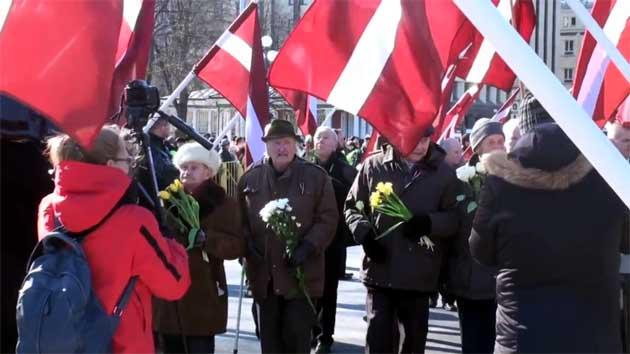Hundreds of Latvians marched on Saturday 16 March 2013 through the
capital, Riga, to celebrate armed Latvian SS units who fought
side-by-side with the Germans during WWII against the Soviet Union.
Anti-fascists and representatives of the Russian minority protested
against the "legionnaires’ march", as is now traditional.
The quarreling parties laid wreaths at different times at the
Freedom Monument in the center of Riga, which honors soldiers killed
during the Latvian War of Independence of 1918-1920. The authorities
mobilized large numbers of police forces to keep both sides from
clashing.
The ITAR-TASS agency reported that nationalists beat up the leader of the anti-fascists,
Janis
Kuzins, before police officers could intervene. One assailant was
arrested. "They broke my nose, I was bleeding," Kuzins said on the
radio. No larger incidents were reported.
According to the Russian media, the
"march by veterans of the armed SS" was attended by not quite 1 000
people, including several politicians from the ruling camp and followers
from Estonia and Lithuania. The "legionnaires" faced anti-fascists
shouting the slogan "A World Without Nazism!" and singing traditional
Russian songs, such as "Three Tankists".
Incidents were generally restricted to exchanges of verbal insults.
Police officers arrested five people, some of them women, who tore the
black ribbon reading "In Memory of the Victims of Fascism" off of the
wreath laid by anti-fascists at the Freedom Monument. Police officers
reportedly also did their best to apprehend anti-fascists protesting the
legionnaires with air raid sirens.
The nationalists announced
they would be demanding the resignation of the interior minister over
what they viewed as the police failure to keep the counter-protests by
Russian-speaking demonstrators from becoming too loud. Latvian Interior
Minister Rihards Kozlovskis does not intend to resign and said that in
his view the law does not regulate the noise levels of protests.
Many Latvians consider 16 March an opportunity to commemorate the
fallen Latvian SS units who in their view fought against the Soviet
occupation. Many Russians, however, consider this commemoration to be a
celebration of fascism, which they made clear by setting up a gallows
near the Freedom Monument and displaying photographs of concentration
camps and executions of civilians. As many as 25 000 Jewish people were
shot to death in the Riga area during the war.
According to the "legionnaire" followers, the Latvian SS division
was not created until 1943, by which time most of the pre-war Jewish
community of about 80 000 people had already been annihilated. They
consider this to be proof that the units did not participate in the
Holocaust as their opponents claim.
"Legionnaire" marches have been held in Latvia since 1990. In the
past they have been accompanied by brawls with protesting anti-fascists
and police interventions resulting in dozens of arrests.
In the
first years after Latvia most recently gained independence, 16 March was
an official holiday, but it was removed from the calendar under
pressure from Russia and the West. This week the Latvian Parliament
rejected a proposal to reinstate the holiday.
The marches have been held in recent years despite official bans. This year the Riga town hall permitted the march.
Latvia won independence from Russia after WWI, but the country was
occupied by the Soviets in 1940. After the Germans attacked the Soviet
Union, the Nazi occupation of Latvia followed.
About 250 000
Latvians fought in the war, either alongside the Germans or the Soviets.
Around 150 000 Latvians total fell in battle, while tens of thousands
were subjected to deportation or labor camps.
